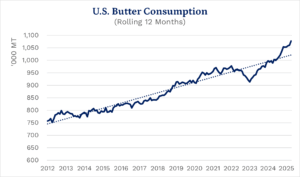The National Milk Producers Federation (NMPF), the U.S. Dairy Export Council (USDEC) and the Consortium for Common Food Names (CCFN) applauded the announcement late yesterday of a new trade framework between the United States and Indonesia that eliminates tariffs on the vast majority of U.S. exports and contains pledges to remove longstanding nontariff barriers affecting American dairy products.
“This looks like it will be a significant win for U.S. dairy. We commend the Trump Administration for securing an agreement that should deliver real benefits for our dairy farmers,” said Gregg Doud, president and CEO of NMPF. “We are pleased to hear this framework removes roadblocks to trade and will help grow dairy sales in one of the world’s most populous markets. NMPF looks forward to reviewing the details of the agreement and working with the Administration to ensure Indonesia upholds its end of the bargain.”
As outlined in a White House factsheet issued yesterday, Indonesia will eliminate tariffs on approximately 99% of U.S. exports; recognize U.S. regulatory oversight, including by listing all U.S. dairy facilities and accepting certificates issued by U.S. regulatory authorities; and commit to implement a fair and transparent process for handling geographical indications (GIs) to ensure common cheese names are respected.
“Yesterday’s announcement is an important step forward in advancing opportunities for U.S. dairy exporters. This deal is poised to strengthen our long-term partnership with Indonesia while giving U.S. dairy companies a better shot at competing fairly,” said Krysta Harden, president and CEO of USDEC. “While verification that Indonesia honors its commitments will be necessary, the removal of both tariff and nontariff barriers is precisely what our industry needs to create new momentum for U.S. dairy exports and deeper collaboration with a key Southeast Asian partner.”
“The prospect of having Indonesia commit to a more transparent and balanced approach to GIs would be a meaningful advance in the global fight to preserve the use of common food names like parmesan and feta,” said Jaime Castaneda, executive director of CCFN. “We commend the U.S. negotiators for prioritizing this issue, particularly at a time when European Union is attempting to expand their GI abuse in growing dairy markets and shut out the United States. We will work diligently with the U.S. government to hold Indonesia accountable to their commitments on common names.”
The United States exported $246 million in milk powders, whey products, cheese and other dairy ingredients to Indonesia in 2024, making it the seventh largest U.S. dairy export destination. The agreement complements ongoing work by NMPF and USDEC to support integration of school milk into Indonesia’s new Free Nutritious Meals program and foster greater collaboration on trade.
NMPF, USDEC and CCFN also welcomed the news that agreements had been struck this week with the Philippines and Japan, with details forthcoming.

 By Clay Detlefsen,
By Clay Detlefsen,  By Paul Bleiberg,
By Paul Bleiberg, 




